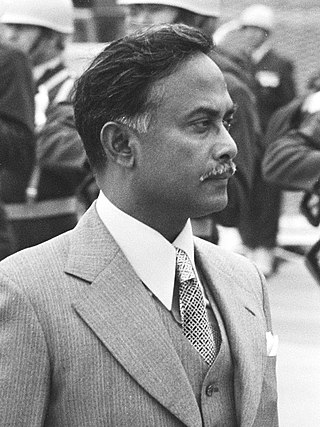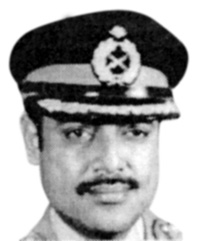Related Research Articles

Lt. General Ziaur RahmanBUHJ, was a Bangladeshi military officer and politician who served as the President of Bangladesh from 1977 to 1981. He was assassinated on 30 May 1981 in Chittagong in an army coup d'état.

Khondaker Mostaq Ahmad was a Bangladeshi politician. He was the President of Bangladesh from 15 August to 6 November 1975, after the assassination of Sheikh Mujibur Rahman. He was part of the conspiracy that brought about the assassination of Sheikh Mujibur Rahman on 15 August 1975. He took on the role of president immediately after the assassination, praised the assassins as "sons of the sun" and put cabinet ministers loyal to Sheikh Mujibur Rahman in jail.
Abu Taher was a Bengali military serviceman, who served in the Pakistan Army, and later in BDF. He crossed into India around early August and reported to the Indian authorities. After a week screening at Dehradun, India, Taher reported to Kolkata, Bangladesh Provincial government at 8 Theatre Rd. He was ordered to report to Sector 11 of Mukti Bahini under command of Major Ziaur Rahman, he became the sector commander after him. He served in BDF from end of August to 2 November 1971. He was awarded the medal Bir Uttom for his gallantry in the liberation war. He was released from military service by Indian military medical board in Pune, India after his leg was amputated. After independence, he was inducted into the Bangladesh Army for administrative retirement with legacy rank of Lieutenant Colonel. After settling in with family, the government of Bangladesh appointed him with employment at Kumilla. Later Taher turned into a political activist and leader of the left-wing Jatiyo Samajtantrik Dal.

Khaled Mosharraf, Bir Uttom was a Bangladeshi military officer known for his role in the Bangladesh Liberation War. Khaled was the Sector Commander of Bangladesh Forces Sector 2, leader of the Crack Platoon and K Force (Bangladesh) Brigade Commander during the Bangladesh War of Independence. He fought heroically for Bangladesh's independence and was wounded in front line combat against the Pakistan Army. Under his command K-Force played a crucial role in the unconditional surrender of the Pakistani Army on 16 December 1971. On 23 October, while commanding an operation of the K-Force, Khaled Mosharraf was gravely wounded by enemy fire and required a long period of recovery. Although he suffered a bullet injury, he recovered and remained in command of Bangladesh Forces Sector 2. He is best known as an exceptional combatant who had planned and carried out guerrilla warfare from deep within the jungles of Melaghar. More than thirty five thousand guerilla fighters fought under Khaled's command in sector 2.

Bangladesh has undergone several changes of government since its independence. Between the first recorded uprising in August of 1975 and the last known attempt in December of 2011, Bangladesh has been through as many as 29 military Coups.
National Revolution and Solidarity Day was celebrated in Bangladesh on November 7, officially until 2007. This commemorates the November 1975 uprising formed by the people and regular army soldiers of Dhaka Cantonment. Khandkar Mushtaq Ahmed was removed from the Presidency by Brigadier Khaled Mosharraf. This situation led to an uprising, spearheaded by Lt.Col. Abu Taher and his political group Jasad to grab power. It ended the four-day coup organised by Brigadier Khaled Mosharraf, who got killed in the aftermath, while soldiers of Dhaka Cantonment proceeded to release Major General Ziaur Rahman, who was put under house arrest at the inception of the coup by Brigadier Khaled Musharraf.
Syed Faruque Rahman was a coup member involved in toppling the Sheikh Mujib regime in Bangladesh. He was convicted and hanged on 28 January 2010 along with co-conspirators Sultan Shahriar Rashid Khan, A.K.M. Mohiuddin Ahmed, Mohiuddin Ahmed, and Mohammad Bazlul Huda in Dhaka Central Jail, Old Dhaka, for the murder of Sheikh Mujibur Rahman, the founder and first President of Bangladesh. Sayed Faruque Rahman and his close ally Kahandaker Abdur Rashid were the chief organisers of the assassination of Sheikh Mujibur Rahman on 15 August 1975. He was 2IC of the 1st Bengal Lancers Regiment of the Bangladesh Army who led a group of junior army officers in-order to overthrew the regime of Sheikh Mujibur Rahman and installed Khondaker Mushtaque Ahmed as President of Bangladesh.
Muhammed Abul ManzurBU was a Bangladeshi military officer who commanded the Bangladesh Forces operations in Sector 8 during the Bangladesh Liberation War against Pakistan in 1971. He was allegedly involved in the assassination of the then-President of Bangladesh, Ziaur Rahman. The erstwhile Chief of Army Staff and alleged mastermind of Rahman's assassination, Hussein Muhammad Ershad, had put a standing shoot-to-kill order on Manzur's life—he was killed shortly after being captured at the border. About a year later, Ershad initiated a bloodless coup d'état and took over the Central Government, holding power until 1990.

The Jatiya Samajtantrik Dal is a political party in Bangladesh. The party was founded by Serajul Alam Khan.
The office of the Chief Martial Law Administrator was a senior and authoritative post with Zonal Martial Law Administrators as deputies created in countries such as Pakistan, Bangladesh and Indonesia that gave considerable executive authority and powers to the holder of the post to enforce martial law in the country in an events to ensure the continuity of government. This office has been used mostly by military officers staging a coup d'état. On some occasions, the office has been under a civilian head of state.
Shafaat Jamil, Bir Bikrom was a Bangladesh Army colonel. He was the commanding officer of the 3rd East Bengal Regiment of Z Force Brigade in Sector 11 of Bangladesh Forces during the War of Bangladesh Independence in 1971. He was among the first Bengali officers who rebelled against the Pakistani Army in the 1971 Liberation War of Bangladesh and later fought in 11 sector and in Sylhet sector.
The 1982 Bangladeshi military coup d'état deposed the civilian government headed by the President of Bangladesh Abdus Sattar and brought to power the Chief of Army Staff of the Bangladesh Army Lt. Gen. Hussain Muhammad Ershad. After serving initially as the Chief Martial Law Administrator, Ershad assumed the post of president in 1983 and ruled until 1990.
Major General Khaled Mosharraf was assassinated on November 7, 1975. He was a Bangladeshi military officer who was the Sector Commander of Bangladesh Forces Sector 2 and K-Force Brigade Commander during the Bangladesh Liberation War.

Abu Taher Mohammad Haider, Bir Uttom was a Bangladesh Army officer and recipient of Bir Uttom, the second highest military award in Bangladesh. He fought in the Bangladesh Liberation War as the second-in-command of the K force under Khaled Mosharraf. Later he became the sector commander of sector-2 from September 22, 1971. After the assassination of the President of Bangladesh, Sheikh Mujib in a military coup; he joined a counter coup led by his former commander Major General Khaled Mosharraf. He was killed in a situation marred with confusion along with Khaled Mosharraf on 7 November 1975 by proponents of a counter coup led by Colonel Abu Taher.
The 15 August 1975 Bangladesh coup d'état was a military coup launched by mid ranking army officers in Bangladesh on 15 August 1975. The officers were part of a conspiracy to assassinate Sheikh Mujibur Rahman, the Founding Father of Bangladesh, who led the independence struggle during the Bangladesh Liberation War and later served as the first and fourth President and later in between his two presidential terms served as the second Prime Minister of Bangladesh from April 1971 until his assassination in August 1975. Sheikh Mujibur Rahman and most of his family members were killed during the coup, with the exception of his two daughters Sheikh Hasina and Sheikh Rehana.
The 7 November 1975 Bangladesh coup d'état was a coup d'état launched by left-wing army personnel in collaboration with left-wing politicians from Jatiya Samajtantrik Dal. The coup resulted in the death of Major General Khaled Mosharraf, who only 3 days prior, led a coup against those involved in the assassination of Sheikh Mujibur Rahman. During the coup, Ziaur Rahman was freed from house arrest, enabling him to seize power and become president.
The 3 November 1975 Bangladesh coup d'état was a military coup d'état led by Major General Khaled Mosharraf to remove the assassins of Sheikh Mujibur Rahman from power.

Deyal is a 2013 political/historical novel by Bangladeshi writer Humayun Ahmed, based on the socio-political crisis in the aftermath of the war of independence of Bangladesh. It was the last novel of the writer and was published one year after his death. The publication of the book was delayed by a High Court verdict.
Mohammad Ziauddin, BU is a retired Bangladeshi military officer, who was the Commanding Officer of the 1st East Bengal Regiment during the Bangladesh Liberation War. He was awarded the Bir Uttom, the country's second highest gallantry award for his outstanding bravery in the Liberation War. His certificate number was 22.
Nawazesh Uddin was a Bangladeshi army officer who was executed for his alleged involvement in the assassination of Ziaur Rahman.
References
- 1 2 Mascarenhas, Anthony (1986). Bangladesh : a legacy of blood. Hodder and Stoughton. ISBN 0-340-39420-X. OCLC 242251870.
- 1 2 3 4 5 6 7 8 9 "When Gen Zia betrayed Col Taher". www.observerbd.com. Retrieved 2022-12-24.
- 1 2 3 4 5 6 7 Lifschultz, Lawrence (1979). Bangladesh : the unfinished revolution. Zed Press. ISBN 0-905762-07-X. OCLC 883842630.
- ↑ sun, daily. "Khaled Mosharraf Killing: An Eyewitness Account | Daily Sun |". daily sun. Retrieved 2022-12-24.
- 1 2 Niloy, Suliman. "'Zia staged trial to kill Col Taher'". bdnews24.com. Retrieved 2022-12-24.